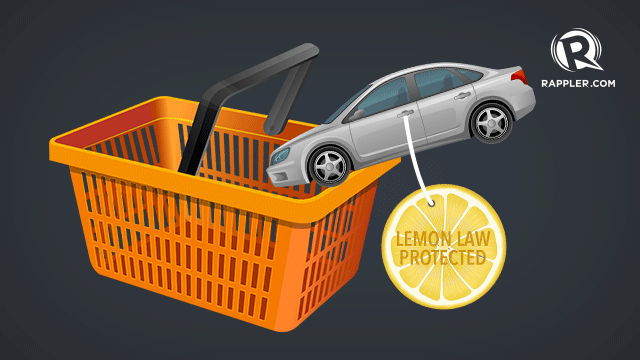SUMMARY
This is AI generated summarization, which may have errors. For context, always refer to the full article.

MANILA, Philippines – Are you a consumer who’s fed up with lemons?
If a proposed “Lemon Law” gets a shot in the 16th Congress, your woes may dissipate somewhat.
After being deliberated on for the past 3 Congresses, Tarlac Rep Susan Yap refiled House Bill No. 303 or the “Lemon Law of 2013.” It seeks to protect the right of consumers against deceptive, unfair, and unfriendly sales and trade practices of motor vehicles.
A “lemon” refers to a badly flawed item and is a term which was adapted in the early 20th century to describe vehicles.
The local version of the United States lemon law was adopted during the 13th and 14th Congress but it did not make the cut.
Leyte Rep Lucy Torres-Gomez filed it again in the 15th Congress and it was approved on third reading in the House of Representatives.
“Many Filipinos have been victimized by false warranties and they cannot resort to legal remedies because of the absence of a law addressing their concern,” Yap said.
Through the bill, consumers will have the right to demand the replacement of a vehicle — discovered to have a factory defect — with a similar or comparable one.
Consumer friendly
Yap said warranties available today only offer continued repairs of defective vehicles until the warranty period expires.
With the “Lemon Law,” the manufacturer will be given 4 separate repair attempts, after which the owner may invoke his right to obtain a refund of the amount he paid for the vehicle.
The consumer can also file a complaint before the Department of Trade and Industry (DTI) if the manufacturer’s repairs remain unsatisfactory.
The proposed bill covers the first 12 months, or the first 20,000-km mileage from the vehicle’s date of purchase.
Until the vehicle’s repair, the manufacturer or distributor is also mandated to compensate and shoulder a reasonable daily transportation allowance for the consumer.
Once passed, manufactures or distributors who are found in violation of any provision in the “Lemon Law” will be held liable and be fined a minimum of P100,000 in damages, “without prejudice to any civil or criminal liability.”
Whether or not the proposed “Lemon” bill will again be squeezed out of Congress remains to be seen. – Rappler.com
Car vector via Shutterstock
Lemon vector via Shutterstock
Shopping basket vector via Shutterstock
Add a comment
How does this make you feel?
There are no comments yet. Add your comment to start the conversation.